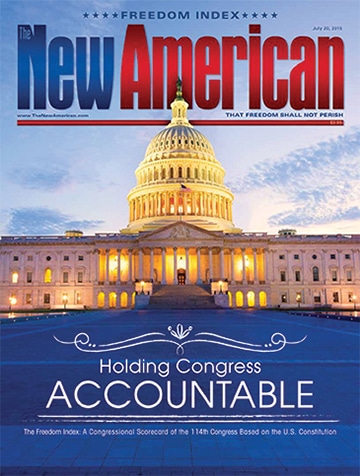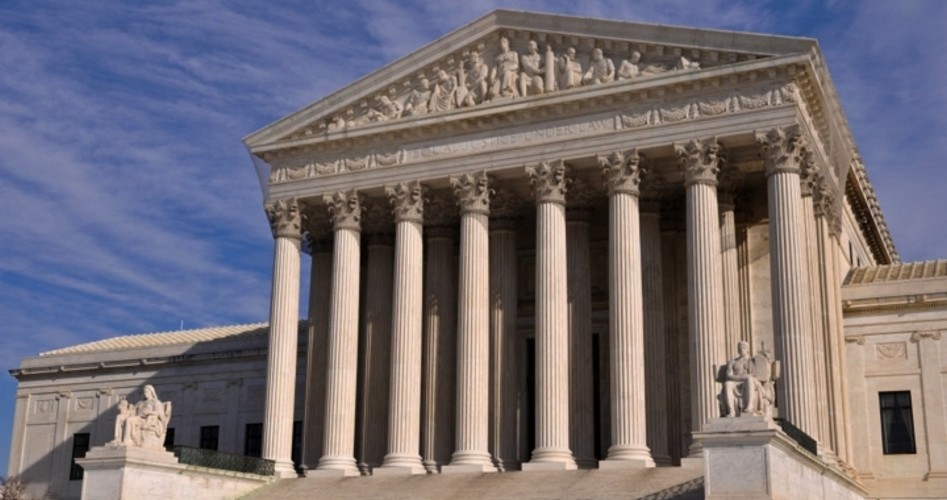Supreme Court Once Again Saves ObamaCare by Rewriting It
“We should start calling this law SCOTUScare,” Supreme Court Justice Antonin Scalia, using the acronym for the court, declared Thursday as a majority of his colleagues once more rewrote the Affordable Care Act (ACA) to save it.
In the case of King v. Burwell, the court ruled 6-3 that the plain language of the ACA means something entirely different. Although the law specifically states that refundable tax credits for the purchase of insurance are available only when coverage is bought on “an exchange established by the state,” the majority — Chief Justice John Roberts along with Justices Anthony Kennedy, Stephen Breyer, Ruth Bader Ginsburg, Elena Kagan, and Sonia Sotomayor — found this phrase “ambiguous.”
“If the statutory language is plain, we must enforce it according to its terms,” Roberts wrote for the majority. Indeed, he observed, “petitioners’ arguments about the plain meaning … are strong.” But Roberts, who also helped rescue ObamaCare in 2012 by recasting its penalties as taxes and changing the terms of its Medicaid expansion, found that “the context and structure of the act compel us to depart from what would otherwise be the most natural reading of the pertinent statutory phrase.”
“The phrase ‘an exchange established by the state’ … may be limited in its reach to state exchanges,” Roberts argued. “But it is also possible that the phrase refers to all exchanges — both state and federal — at least for purposes of tax credits.”
In truth, the language of the law is unambiguous. It quite clearly states that the tax credits — which, by virtue of being refundable, are actually subsidies — are available only on state exchanges, and with good reason. “The ACA’s legislative history,” noted columnist George Will, “demonstrates that the subsidies were deliberately restricted to distribution through states’ exchanges in order to pressure the states into establishing their own exchanges.” ACA architect Jonathan Gruber, too, was under this impression, telling an audience in 2012, “If you’re a state and you don’t set up an exchange, that means your citizens don’t get their tax credits.”
Unfortunately for Democrats, 34 states have thus far refused to establish exchanges, forcing the Department of Health and Human Services (HHS) to do so in their stead. Rather than see ObamaCare undermined by the lack of subsidies — the individual mandate kicks in only when coverage is deemed affordable, and absent subsidies, it rarely is — the Internal Revenue Service declared that the tax credits would be offered to anyone buying exchange coverage regardless of whether that exchange was established by a state or by HHS. Four Virginians took the Obama administration to court over the regulation, and that is the case that wound up before the Supreme Court as King.
Roberts and his cohorts also apparently believe it is their job to modify the law, or at least ratify the Obama administration’s modifications, in order to preserve the ACA. Their opinion goes into great detail about the reasons for including the tax credits and the supposedly “calamitous” consequences of enforcing the law as written — namely that the exchanges would collapse into a “death spiral” once so many people were exempted from the individual mandate and only those in immediate need of insurance actually bought it.
“Congress passed the Affordable Care Act to improve health insurance markets, not to destroy them,” Roberts wrote. “If at all possible, we must interpret the Act in a way that is consistent with the former, and avoids the latter.”
“In other words,” blogged Reason’s Peter Suderman, “there would have been policy implications to a ruling for the plaintiffs. That is almost certainly true, but it is not an excuse to rewrite the clear language of the law.”
Simply ruling that the law means what it says, after all, would not necessarily have put an end to ObamaCare. Congress could have reinstated the subsidies or come up with other ways it (mistakenly) thought the law could be made to work. And, yes, it might have repealed the ACA.
“The Supreme Court, however, decided not to take any chances on democracy, so … it effectively changed the statute,” observed David French of National Review.
That was too much for Scalia, who penned a withering and often humorous dissent in which he was joined by Justices Samuel Alito and Clarence Thomas.
“Words no longer have meaning if an exchange that is not established by a state is ‘established by the state,’” Scalia remarked. “But normal rules of interpretation seem always to yield to the overriding principle of the present court: The Affordable Care Act must be saved.”
Scalia referred to the court’s assertion that “established by the state” means “established by the state or the federal government” as “quite absurd,” adding that “the court’s 21 pages of explanation make it no less so.” He called various portions of the court’s reasoning “feeble,” “interpretive jiggery-pokery,” a “defense of the indefensible,” a “dismal failure,” and “somersaults of statutory interpretation.”
Scalia agreed that the phrase needed to be read in the context of the entire law. “Let us not forget, however, why context matters: It is a tool for understanding the terms of the law, not an excuse for rewriting them.” He also pointed out that the majority ignored context where it did not help them reach their seemingly foregone conclusion.
Scalia summarized the majority opinion thus: “The court’s interpretation clashes with a statutory definition, renders words inoperative in at least seven separate provisions of the act, overlooks the contrast between provisions that say ‘exchange’ and those that say ‘exchange established by the state,’ gives the same phrase one meaning for purposes of tax credits but an entirely different meaning for other purposes, and … contradicts the ordinary meaning of the words Congress used.”
“Today’s opinion changes the usual rules of statutory interpretation for the sake of the Affordable Care Act. That, alas, is not a novelty,” Scalia wrote. The two cases in which the court has upheld ObamaCare in the face of plain English, he maintained, “will publish forever the discouraging truth that the Supreme Court of the United States favors some laws over others, and is prepared to do whatever it takes to uphold and assist its favorites.”
Of course, not everyone was upset with the court’s decision. President Barack Obama, for one, praised it, saying, “After multiple challenges to this law before the Supreme Court, the Affordable Care Act is here to stay.”
Republicans, meanwhile, vowed to continue fighting to overturn or at least modify the law — though, as the Washington Post reported, “party leaders were privately breathing a sigh of relief” because now they won’t have to come up with a solution to lost subsidies. Still, the ruling is likely to increase the pressure on GOP candidates to come up with ObamaCare alternatives should the party retake the White House next year.
But whether ObamaCare is repealed, replaced, or left unchanged, the damage has been done. The court’s decision not to interpret the law as written but to change it to make it work, Will lamented, “facilitates what has been for a century progressivism’s central objective, the overthrow of the Constitution’s architecture,” turning the three branches of government from checks on each other to partners in crime.



